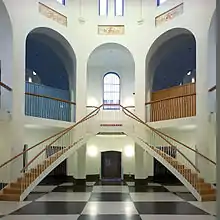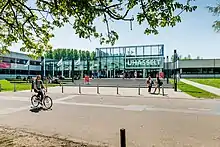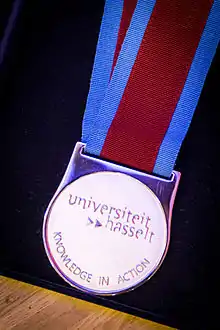Hasselt University
Hasselt University (Dutch: Universiteit Hasselt) is a public research university with campuses in Hasselt and Diepenbeek, Belgium.[1] It was officially established in 1971, as the Limburgs Universitair Centrum (LUC). In 2005, the university changed its name to Hasselt University.
 | |
| Motto | 'Knowledge in Action' |
|---|---|
| Established | 1971 (UHasselt since 2005) |
| Budget | 89.6 million euro (2016) |
| Rector | Bernard Vanheusden (2020 - now) |
Administrative staff | ± 1,296 (2017) |
| Students | ± 6,395 (2016-2017) |
| Location | , |
| Campus | Diepenbeek and Hasselt |
| Colours | Black |
| Nickname | UHasselt |
| Website | www.uhasselt.be |
Hasselt University is an innovative university which has a pronounced international orientation. It stands for excellence in education, top research in spearhead fields and active commitment to innovation and entrepreneurship. This is reflected by its ranking amongst the best 10% universities worldwide in U-Multirank 2019. The overall objective is to combine academic excellence with economic and social relevance. Hasselt University has an extensive international network and is a partner in a variety of international research and education projects.[2]
Hasselt University is ranked 65th in the Times Higher Education-ranking of universities younger than 50 years.[3] According to Times Higher Education Ranking 2020 University of Hasselt is among the top 351 - 400 universities worldwide.[4] Currently, the universities of Hasselt and Maastricht work together as the Transnational University Limburg (tUL). Together with Hogeschool PXL, it established the Limburg Association of Higher Education (AUHL).
The rector of the university currently is Prof. Luc de Schepper, the vice rectors are Prof. Karin Coninx and Prof. Jean-Michel Rigo.
History

Hasselt University was officially established in 1971 as ‘Limburgs Universitair Centrum’ (LUC), but it was not until 1973 that the university – literally – opened its doors and welcomed its first students. Until 1991 the university was, in fact, an undergraduate level university institution with two faculties: the Faculty of Medicine-Dentistry and the Faculty of Sciences (with study programmes in Mathematics, Physics, Computer Science, Chemistry and Biology). In 1991 the university expanded the reach of its curriculum by transforming the Limburg Business School (Economische Hogeschool Limburg), an independent university college which was located on the same campus in Diepenbeek, into the Faculty of Applied Economics. At the same time, Hasselt University became entitled to organize postgraduate programmes and award doctoral degrees in its three faculties.
Briefly Hasselt University is a young university that has achieved enormous growth in the past four decades.
1973 The Limburg University Centre (LUC for short) – the predecessor of Hasselt University - officially opens to students in Diepenbeek, two years after the legal authorisation of the creation of an autonomous university institution in Limburg. LUC starts with six programmes: mathematics, physics, chemistry, biology, dentistry and medicine.
1991 Limburg Economic University College is integrated into LUC and becomes the Faculty of Economic Science (now the Faculty of Business Economics).
2002 LUC and Maastricht University jointly establish the Transnational University of Limburg (tUL) – an internationally unique partnership of two universities in two countries. The computer science, statistics and biomedical sciences programmes are organised under the tUL umbrella.
2003 LUC and the Limburg university colleges PHL and XIOS (which have since merged to form PXL University College) together form the Limburg University and Colleges Association (AUHL).
2004 The Bachelor’s and Master’s programmes in transportation sciences – the only ones of their kind in Flanders – are added to the curriculum.
2005 The Limburg University Centre is renamed Hasselt University, or UHasselt for short.
2008/2011 Hasselt University launches its Bachelor of Law degree, a collaboration with Maastricht University and KU Leuven. Three years later, a Master’s programme in law follows.
2012 Hasselt University opens a second campus: the ‘urban campus’ in the centre of Hasselt. Hasselt Campus includes the Rectorate Building, the Law Faculty building and – right at the centre – the Oude Gevangenis (Old Prison). This is the place where law students attend classes and where new students must register.
2013 Four new programmes are introduced in Hasselt University in the academic year 2013-2014: • architecture • interior architecture • engineering technology • rehabilitation sciences and physiotherapy
At the same time, two new faculties are established: • Faculty of Architecture and Art • Faculty of Engineering Technology
This increases the number of faculties from four (Business Economics, Medicine and Life Sciences, Law and Sciences) to six.
2014 Hasselt University establishes the School of Transportation Sciences and the Hasselt University School for Expert Education (UHasselt SEE).
2015 The Faculty of Business Economics launches the business administration programme.[5]
International collaborations
In 2001 the Flemish and Dutch Ministers of Education signed an International Treaty by which the transnational University Limburg (tUL) was founded. Academic staff from Hasselt University and from nearby Maastricht University (in the Dutch Province of Limburg) since then jointly undertake research activities and offer degree programmes in Life Sciences and Computer Sciences.
Limburg Association of Higher Education
In 2002 Hasselt University, together with Hogeschool PXL established the Limburg Association of Higher Education (AUHL). The AUHL was founded to enhance cooperation between higher education institutions in the region.

New city campus
In the past decade Hasselt University has expanded its curriculum thoroughly. Since September 2004,the university offers a unique programme (bachelor and master) in Transportation Sciences. A bachelor programme in Law was established in September 2008, in cooperation with Maastricht University and KU Leuven. Three years later a master programme in Law was created.
2012 proved to be a new milestone in the university’s young existence, with the inauguration of the ‘city campus’ in Hasselt.
Higher education reform
In September 2013 four new (bachelor and master) programmes were added to the university’s curriculum: Architecture, Interior Design, Rehabilitation Sciences & Physiotherapy and Industrial Sciences. This expansion also entailed the creation of two new faculties: the Faculty of Architecture & Arts and the Faculty of Engineering Technology. That brings the total number of faculties to six, alongside the Faculty of Business Economics, Faculty of Medicine & Life Sciences, Faculty of Sciences and the Faculty of Law. In 2014, the School of Transportation Sciences was established.
Hasselt University is home to about 6,000 students and 1,200 academic, administrative and technical staff members.
Campuses

Campus Hasselt
The head office of Hasselt University is located at campus Hasselt. The complex consists of three buildings, located near each other: the Vice Chancellor’s Office Building, the Faculty of Law and the ‘Oude Gevangenis’ (the renovated ‘Old City Jail’). The former city prison provides a new home to primarily law students, with several study rooms and two auditoriums. The Student Service Center, where enrollment of new students takes place, is also located in the ‘Oude Gevangenis’.
Campus Diepenbeek
Since 1973 Hasselt University is located on the Campus Diepenbeek, which occupies a 75-acre site. Moreover, several institutes for applied research, an incubator for starting small enterprises, and several small businesses interacting with the research activities of the university are located on campus Diepenbeek. Building D includes the agora, the student restaurant and the library.
Programmes
| Faculty | Bachelor's programmes | Master's programmes |
|---|---|---|
| Faculty of Medicine and Life Sciences |
|
|
| Faculty of Sciences |
|
|
| Faculty of Engineering Technology |
|
|
| Faculty of Business Economics |
|
|
| Faculty of Law |
|
|
| Faculty of Architecture and Arts |
|
|
| School for Transportation Sciences |
|
|
Figures
Student population:[6]
- 2008-2009: 2,628 students
- 2009-2010: 2,886 students
- 2010-2011: 3,084 students
- 2011-2012: 3,310 students
- 2013-2014: 5,500 students
In 2016, 15% fewer students enrolled for the new academic year, with just 1,250 freshmen starting.[7]
Staff population: On February 1, 2014, 1,100 staff members were employed at Hasselt University.[8]
Academic Profiles
| University rankings | |
|---|---|
| Global – Overall | |
| ARWU World[9] | 601-700 (2019) |
| THE World[10] | 351–400 (2020) |
| USNWR Global[11] | 789 (2020) |
The university is included in major world university rankings, e.g. that of the Academic Ranking of World Universities, Times Higher Education World University Rankings and U.S. News & World Report Best Global University Ranking.
Institutes
Hasselt University has six research institutes:
- BIOMED - Biomedical Research Institute
- CenStat - Centre for Statistics
- CMK - Centre for Environmental Sciences
- EDM - Expertise Centre for Digital Media
- IMO - Institute for Material Research
- IMOB - Transportation Research Institute
Student organisations
The most important student organisation is the Student Council or StuRa. This body of 14 elected students makes sure the student's rights are respected in every way. The chairman also has a seat in the university's Board of Governors.
Other student organisations at Hasselt University are:
- ESN Hasselt (Erasmus student network)
- AIESEC (Association Internationale des Etudiants en Sciences Economiques et Commerciales) https://web.archive.org/web/20161110190444/http://www.aieseclimburg.be/
- Junior Consulting (A student consultancy organisation)
- Dip's (For students biology and chemistry) http://www.dips.be
- Filii Lamberti (For students mathematics, physics and CS) http://www.filii.be
- Miezerik (For medicine students) https://web.archive.org/web/20050406165036/http://miezerik.luc.ac.be/
- Biomedica (For students biomedical sciences) http://biomedica.uhasselt.be
- Hermes (For students economy) http://www.hermesdiepenbeek.be/
- Commeatus A new organisation for students who study transport studies. http://www.commeatus.be (Site in Dutch only)
- CCG (Christelijke Campus Gemeenschap; Christian Campus Society) http://www.ccgdiepenbeek.be
- VLUG (Vrijzinnig Limburgs Universitair Genootschap ; Secular Limburgish University Society)
Honorary Degrees
Over the past four decades, Hasselt University has bestowed 66 honorary degrees. In 2013, Martin Cooper - also known as 'father of the mobile phone' - joined the UHasselt Honorary Doctors. He was nominated by the Student Council.

Honorary Doctors Hasselt University
- Morten Bennedsen
- Mariana Mazzucato
- Stijn Bijnens
- Martha Nussbaum
- Jean-Marie Tarascon
- Paul Stoffels
- Kunlé Adeyemi
- John Lloyd Provis
- Emmanuel de Merode
- Richard D. Bardgett
- Jeremy Rifkin
- Thomas Friedman
- S. Tamer Cavusgil
- Christine Van Broeckhoven
- Bijoy Jain
- Luc Deleu
- Henry Chesbrough
- Lieven Maesschalck
- Michael Braungart
- Heinz Klug
- Richard Friend
- Jean-Jacques Cassiman
- John G. F. Cleland
- Silvana Sciarra
- Wil van der Aalst
- Ramesh Raskar
- Johny Vansevenant
- Mahmoud F. Fathalla
- Marc Bossuyt
- Monder Ram
- Bernardo Secchi
- Ignace Schops
- Andrew B. Holmes
- Richard E. Palmer
- Koen Vanmechelen
- Michael Rowe
- Panamarenko
- Robert Mendelsohn
- Michael Grätzel
- Susan Trumbore
- Alain Hubert
- Ingrid Daubechies
- Piet Lemstra
- Lawrence Steinman
- Alan Thompson
- Baruch Lev
- Gerard Unger
- Shalom Hakkert
- Christopher Alexander
- Axelle Red
- Polly Matzinger
- Cees Dekker
- Kathleen Eisenhardt
- Frank De Winne
- Tom Jovin
- Yuri Gurevich
- David Montgomery
- Michael Berridge
- Harold Kroto
- Roger Langenaken
- David Cox
- Erwin Neher
- Hans Mohr
- Georges Köhler
See also
References
- https://www.uhasselt.be/UH/Hasselt-University/About-UHasselt/About-us/History.html
- https://www.uhasselt.be/rankings
- https://www.uhasselt.be/rankings
- https://www.timeshighereducation.com/world-university-rankings/hasselt-university
- https://www.uhasselt.be/UH/Hasselt-University/About-UHasselt/About-us/History.html
- http://www.uhasselt.be/UH/OverUHasselt/feiten-en-cijfers/Richtcijfers/Cijfers-rond-onderwijs.html
- http://www.hbvl.be/cnt/dmf20160919_02475239/200-minder-inschrijvingen-aan-uhasselt-na-gehypete-opleidingen
- http://www.uhasselt.be/UH/OverUHasselt/feiten-en-cijfers/Richtcijfers/Cijfers-rond-personeel.html
- "ARWU - Academic Ranking of World Universities 2019". Shanghai Ranking. Retrieved 28 September 2019.
- "THE World University Rankings 2020". Times Higher Education. Retrieved 28 September 2019.
- "U.S. News Education: Best Global Universities 2020". US News & World Report - Education. Retrieved 21 November 2019.
External links
| Wikimedia Commons has media related to Hasselt University. |